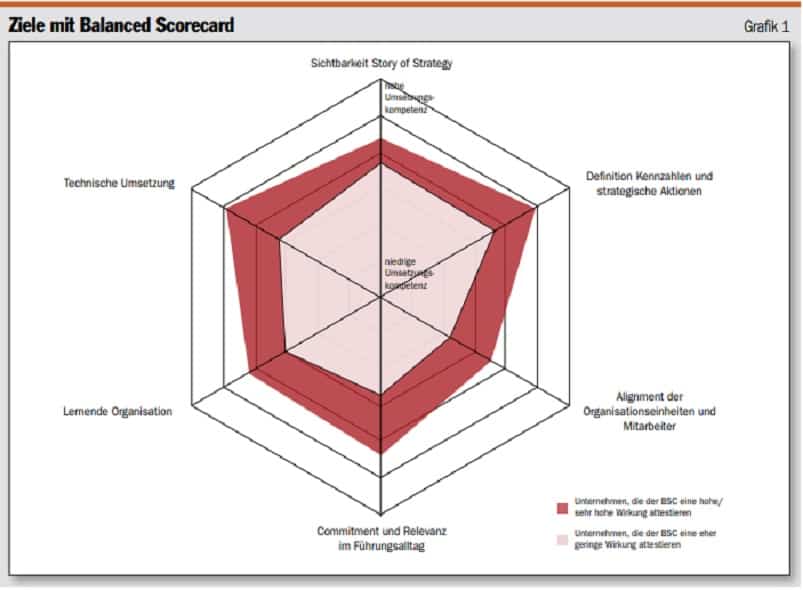make an impact
Many companies have a Balanced Scorecard in use - but often the desired effect is not achieved. Has the BSC concept failed? No. Because the reasons lie in the difficulty of consistently implementing the concept in practice. This is shown by a study of managers in German-speaking Switzerland.

Dhe Balanced Scorecard (BSC) is a celebrated management tool. However, experience also shows that although many companies have a BSC in use, quite a few of them are not satisfied with the effect achieved. But where exactly do these losses of effectiveness occur in practice? The consulting firm Valion AG investigated this question in a study.
Instrument of strategy communication
The study makes clear that the BSC is still understood and applied too strongly as a pure instrument for measuring key figures by companies that criticise the impact of the instrument. This is reflected in the fact that these companies understand less well how to formulate their "story of strategy". Strategic goals are not derived consistently enough from the strategy and are not formulated precisely enough so that they actually show the differentiating features from the competition and the value proposition. Only one fifth of the survey participants who believe that the BSC has a rather low impact are of the opinion that the BSC enables simple and comprehensible communication of the corporate strategy. By contrast, 84 percent of the companies that rate the impact of the BSC as high are convinced of the power of the BSC as an instrument for communicating strategy.
Target achievement
Strengthen However, the reasons for the loss of impact in the application of the BSC in everyday management are even more striking. In particular, the way in which companies deal with deviations from targets and, in advance, with the setting of target values, is structured differently by companies that attest to the BSC's low impact than it is by firms that
Deviations from the target value
attribute a high impact to the BSC. They formulate strategic goals and measure them with key figures - but if the key figures deviate from the target value, there are no consequences. In contrast, the need for action is specified in the form of prioritized actions by companies that attribute a high impact to the BSC. Likewise, good attention is paid to ensuring that the strategic actions are designed in such a way that they actually support the achievement of objectives.
Where are the ambitious goals?
A central aspect that is neglected in connection with the Balanced Scorecard is change management. Implementing a strategy or getting back on track in the event of target deviations always requires the company to change. The BSC can be used as a potent tool to ensure that employees not only recognize the need for change, but also perceive it as urgent. However, this effect can firstly only be achieved if the target values, although
Definition of employee goals
be defined realistically, but also ambitiously. Because only challenging goals lure those addressed out of their comfort zone and motivate them to go the "extra mile" beyond day-to-day operations. 100 percent of the participants who attest to the BSC's high impact set demanding but achievable goals. Only three-fifths of the companies that attribute a rather low impact to the BSC do so. The results make it clear that there is still room for improvement when it comes to setting target values.
incentives for action
Secondly, with regard to change management, it is important to ensure that employees are actually aware of the strategy. Only then can they direct their actions towards achieving the strategic goals. The BSC is an excellent tool for communicating strategy. By translating the strategy into strategic goals, the "story of strategy" can be communicated in a way that is easy to understand. However, additional impact can only be achieved if the BSC serves as the basis for defining employee targets and linking target achievement to an incentive system. With these measures, the strategic goals become personal goals and shape behavior much more strongly. However, it is precisely for this purpose that companies that criticize the effect of the BSC hardly use the Balanced Scorecard. Among the companies that attest to the BSC's high impact, around 70 percent use the BSC as a basis for defining employee objectives and 60 percent link the achievement of objectives to an incentive system.
Define target cascades
In many cases, however - especially in large companies - the employee goals cannot be derived directly from the corporate goals, since the goals at the management level are often formulated in a way that is too abstract and not action-oriented enough for each individual to be able to orient themselves to them. If this is the case, the goals must first be cascaded through the organizational units: In this process, the question of how the organizational unit under consideration can contribute to the achievement of the goal is answered top-down for each goal. Through iterative progression of this process, a stringent cascade of objectives is created, which not only shows everyone what contribution they can make to achieving the objectives. Rather, it ensures strategic alignment, i.e. the alignment of the entire organization with the strategy.
The study makes it clear that this is precisely where many participants have a great need for action: Only just a quarter of the study participants who rate the impact of the BSC as rather low have broken down their scorecards to subordinate hierarchy levels. By contrast, around two-thirds of the companies that believe the BSC has a high impact consistently cascade their scorecards. In addition to alignment, cascading brings the advantage of strengthening the
Only measurement of key figures?
Company-wide thinking: Companies that believe the BSC has a high impact are hardly of the opinion that function-specific thinking prevails in their company. In contrast, more than two-thirds of the companies that criticise the impact of the BSC state that "silo thinking" prevails in their company.
Anchored in everyday management
If the BSC is to achieve sustainable success in the long term, anchoring the instrument and the corresponding culture in everyday management is a key factor. The demands placed on the management of companies are changing faster than ever in the modern age - this fact must be taken into account when using a Balanced Scorecard: Effectiveness is achieved when the goals, their status, the key figures and strategic actions are continuously reviewed and adapted to changing circumstances.
The study supports this practical experience by showing that 90 percent of the companies that rate the BSC as having a high impact discuss it at least quarterly in management meetings. In direct comparison, only a quarter of the companies that rate the impact of the BSC as low discuss it regularly in management meetings. The periodic discussion of the Balanced Scorecard opens up the possibility for management to focus on central strategic issues in addition to day-to-day operations. The BSC thus supports another central element that is often not given the necessary prioritisation in day-to-day management.









